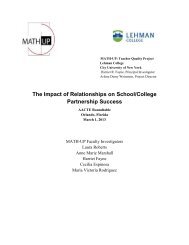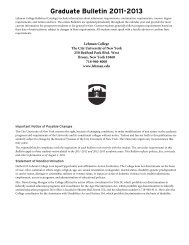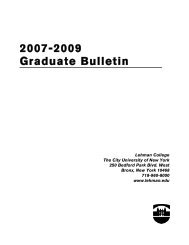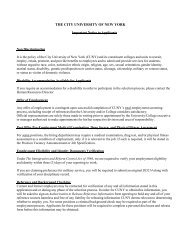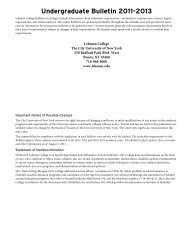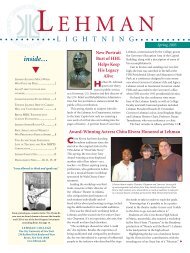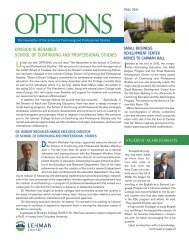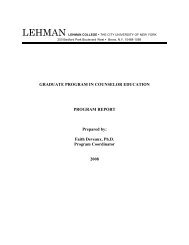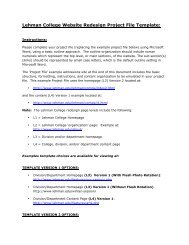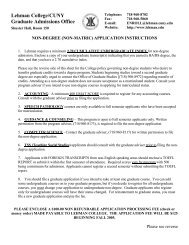Lehman Center Turns Thirty - Lehman College
Lehman Center Turns Thirty - Lehman College
Lehman Center Turns Thirty - Lehman College
Create successful ePaper yourself
Turn your PDF publications into a flip-book with our unique Google optimized e-Paper software.
alumni spotlight<br />
City’s Financial Crisis Detoured Career Plans for<br />
HRA First Deputy Commissioner<br />
Patricia M. Smith ‘74<br />
When Bronx native Patricia M. Smith was considering which college<br />
to attend, her search was limited by one major criterion: it had<br />
to be inexpensive. “My family didn’t have a lot of money,” she says,<br />
“so I had to fi nd something affordable.”<br />
Fortunately, living so close to Fordham Road, she knew that at<br />
nearby <strong>Lehman</strong> <strong>College</strong> she could get a quality education at an<br />
affordable price. “At that time <strong>Lehman</strong> had ‘open enrollment’ and<br />
was ‘free’,” she says, “so it was affordable in the extreme!”<br />
Her fi rst semester, in Fall 1970, was one of the most tempestuous<br />
moments in American collegiate history. “It was the time of the<br />
‘campus revolutionary scene’,” she recalls. “There were plenty of<br />
rallies, protests, and political meetings at <strong>Lehman</strong>.”<br />
It could be a dangerous time on college campuses as well. Smith<br />
recalls how a friend from Westchester attended Kent State—where<br />
on May 4, 1970, members of the Ohio National Guard shot and<br />
killed four unarmed students; after the shootings, the friend’s parents<br />
pulled her out of Kent State and sent her to <strong>Lehman</strong>. “It was a<br />
very tumultuous time,” Smith recalls.<br />
An English major, Smith studied with Professor Billy Collins, who<br />
was just starting out in his teaching and writing career and is now<br />
a Distinguished Professor, as well as recent U. S. Poet Laureate.<br />
“He was immensely popular with students even back then,” she<br />
says. She fondly recalls seeing singer-songwriter Harry Chapin and<br />
Bronx-born comedian Robert Klein perform at the <strong>College</strong>. “Even<br />
before the Performing Arts <strong>Center</strong> was built—which I still attend—<br />
there was a tradition of art and culture at <strong>Lehman</strong>,” says Smith.<br />
Throughout her college career, she had planned to be a teacher,<br />
but when she graduated in 1974, her plan hit a snag. Facing an<br />
unprecedented fi nancial crisis, New York City began laying off<br />
From Teacher to Entrepreneur:<br />
Estrella Rivera Jacobowitz ‘72<br />
28 <strong>Lehman</strong> Today/Fall 2010 – Winter 2011<br />
When Estrella Rivera Jacobowitz (B.A., ‘72) was<br />
growing up near Yankee Stadium, she dreamed<br />
of being the fi rst member of her family to go<br />
to college. The only school she had in mind<br />
was <strong>Lehman</strong>, then known as Hunter <strong>College</strong><br />
Uptown. “It was the college I heard of,” she says.<br />
“Going there was an opportunity I might not<br />
otherwise have had.”<br />
teachers for the fi rst time. “As they<br />
say, ‘I had a B.A. but I needed a<br />
J.O.B.’,” she laughs.<br />
One day, she found herself walking<br />
into an offi ce of the Human<br />
Resources Administration (HRA)—<br />
the city department that administers<br />
such social services as welfare<br />
payments and food stamps—that<br />
led to her fi rst job. Although she still<br />
harbored thoughts of teaching, once<br />
she had gone back to school to earn<br />
an M.B.A., graduating from Pace<br />
University in 1980, she never looked back. She steadily climbed<br />
the ladder and was promoted to her current position of First<br />
Deputy Commissioner in 2002.<br />
During her career with HRA, the agency has witnessed historic<br />
changes to welfare and other human services provided by New<br />
York City and State. By the early 1990s, welfare reform became a<br />
hot-button political issue in national politics for both Republicans<br />
and Democrats—President Clinton signed welfare reform into<br />
law in 1997; however, on a local level, New York City had already<br />
begun to change its welfare system under Mayor Giuliani. “As the<br />
welfare rolls grew,” she says, “so did the idea that we should be<br />
doing something more to help get people into a better economic<br />
situation.”<br />
Case in point: in 1995, 1.2 million people were on welfare in New<br />
York City; now that fi gure is down to 345,000.<br />
Smith rightly takes much pride in her work, helping New York’s<br />
most vulnerable citizens fi nd work and get access to health insurance<br />
or food stamps (not an actual stamp but a debit card). “It’s<br />
sometimes a diffi cult job, but it’s always an important job,” she says.<br />
She admits that after she started at the <strong>College</strong> in 1968, she had<br />
to adjust to collegiate life. “That fi rst year was hard,” she recalls.<br />
“I was a good student in high school, but I was in over my head.<br />
I wanted to learn everything! I took too many classes, and I<br />
struggled. But I eventually fi gured it out.”<br />
Armed with a degree in Spanish literature—she grew up in a<br />
Spanish-speaking home—and minors in Italian and secondary<br />
education, she began teaching in a bilingual curriculum at elemen-<br />
Patricia M. Smith Theodore Swetz<br />
Classical Actor and M.F.A. Director<br />
Theodore Swetz ‘76<br />
Discovered the World at <strong>Lehman</strong><br />
For Theodore Swetz (B.A., ‘76),<br />
better known as Ted to his family<br />
and friends, <strong>Lehman</strong> <strong>College</strong> was<br />
where it all started. It was here in<br />
the Bronx that Swetz discovered<br />
his passion for theatre, particularly<br />
classical theatre.<br />
“When I was an undergraduate<br />
at <strong>Lehman</strong>, the New York theatre<br />
scene was absolutely vibrant,” says<br />
the Yonkers native.<br />
It wasn’t just the lush, green campus<br />
that attracted him to <strong>Lehman</strong>—“most<br />
city universities do not give the typical college experience; there<br />
are no campuses,” he notes—but the phenomenal theatre professors<br />
that he studied with, like Ralph Arzoomanian and Bing D. Bills.<br />
“I got a world-class education at <strong>Lehman</strong>,” he says. “They were<br />
the fi rst people who defi ned a standard for me, which is incredibly<br />
important when you’re young.”<br />
He also got his fi rst real, tangible acting experience. As an undergrad,<br />
he worked with legendary New York theatre producer Joseph<br />
Papp and appeared in three New York Shakespeare productions:<br />
“Pericles” and “Hamlet” (with Sam Waterston and John Lithgow),<br />
both in Central Park, and “A Midsummer Night’s Dream” at<br />
Lincoln <strong>Center</strong>.<br />
After graduation, Swetz immediately sought out legendary,<br />
New York-based acting teachers to continue his development.<br />
“Through my professors at <strong>Lehman</strong>, I learned about the greatest<br />
acting teachers in the world,” he says, “and I sought them out.”<br />
In 1980, after studying with acting icons Stella Adler, Morris<br />
Carnovsky, and Phoebe Brand—“they still infl uence the craft of<br />
tary schools in New York. Four years later, she added a master’s<br />
from NYU to her resume.<br />
As much as she loved teaching, she had always dreamed of having<br />
her own business. In 1980, she married her multilingual skills with<br />
her entrepreneurial drive and opened her Larchmont-based company,<br />
Star Interpreting and Translating.<br />
She fondly recalls how her fi rm grew from a “one-woman show” to<br />
a respected fi rm with three full-time employees and hundreds of<br />
acting to this day,” he says—he moved to Spring Green, Wisc. There<br />
he helped open a classical theatre company, The American Players<br />
Theatre, with Randall Duk Kim, with whom he had fi rst worked in<br />
“Pericles” along with Anne Occhiogrosso and Charles Bright.<br />
It was a risky decision. When he left New York to dedicate himself<br />
to being part of a company and perform in works by Shakespeare,<br />
Chekhov, Sheridan, and Plautus, his career was going well.<br />
“I had three national commercials on the air at the time,” he recalls.<br />
“Commercials are great for the paycheck, but they’re not the reason<br />
why you study theatre. You study theatre to create a classical<br />
theatre company. My agent thought I was crazy. For me, it was an<br />
easy decision.”<br />
In its fi fth year, the American Players Theatre was nominated for<br />
a Tony Award, vindicating his decision. Now, three decades later, it<br />
averages 100,000 patrons each year.<br />
These days, Swetz heads the M.F.A. Professional Actor Training<br />
Program at the University of Missouri–Kansas City, imbuing his<br />
students with his love of classical theatre, particularly Shakespeare—a<br />
passion he traces back to his days at <strong>Lehman</strong>. “My<br />
experience in the <strong>Lehman</strong> Theatre Department opened up the<br />
world to me,” he says, “and I am grateful.”<br />
In the last issue of <strong>Lehman</strong> Today (Spring 2010),<br />
alumna Dr. Sari Dworkin (‘72, ‘76) was misidentifi ed<br />
as Sara Dworkin. Our apologies!<br />
freelance translators who are profi cient in more than eighty-fi ve<br />
languages. “We do a lot of legal work,” she says, “depositions, client<br />
conferences, and trials. But our translators have worked on everything<br />
from menus to movies.”<br />
She also takes no small amount of pride in being a self-made<br />
woman who built up a business from scratch that has existed for<br />
thirty years. “We’ve been around for a long time,” she says. “And I<br />
hope to be around for a lot longer.”<br />
<strong>Lehman</strong> Today/Fall 2010 – Winter 2011 29



